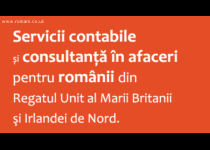BucovinaMissing home is all about how free I feel when I am running around a village from Maramures, how happy I am to accept a traditional gift from an old woman in Bucovina, how close I feel to heaven when praying at Sucevita monastery. Walking up a hill in the middle of autumn, on a valley long forgotten by human beings in the Carpathian mountains, I can communicate with God, as He is so close by. Driving through villages on the way to civilization, I always stop the car to get something. I love the smoked cheese the shepherds sell, and nowhere does honey taste as good as it does when you get it from the villagers. I can never have enough of the little traditional objects that belong to our national customs: painted glass, handmade traditional blouses and skirts, ceramics. I enjoy winter at home where it still smells of cinnamon and baked apples, just as it did when I was a child.
I carry memories with me and they fill my Romanian small universe in the United Kingdom. Romania has amazing historical small towns and cities that carry the international culture and customs aquired over past centuries from different foreign occupations. It is hard to remain a stranger once you get to Romania as everyone is so friendly and willing to feed you and to introduce you to the people and customs of the area where you find yourself.
RomaniaFar away from the national roads, there are small villages in Maramures. A region very rich in tradition, where old people carry on the region's pride and customs. When they celebrate, they wear national costume. In winter they rejoice in the traditional songs and festivals. One can see small children wrapped in sheepskin, as is the custom; young girls with red cheeks who are very fond of the colourful scarves that cover their heads. They are first people of God, people of Maramures, people of Romania, and newly arrived European citizens. Wherever they go in the world, they speak of their traditions and encourage the dreaming foreigner to go and try a new and different experience.
In Moldavia and Bucovina, religion has a special meaning and people live guided by their faith. There are villages with houses carved in wood, where carpenters are more close to sculptors than just workers. They take pride in what they do. Women can often be seen in winter sitting by the fire at home, sewing traditional costumes for young children, for the family heritage or patrimonio. Generation after generation will wear these costumes. They will always be part of the family. There's always a pie in the house, awaiting an unexpected visitor, polenta and home made cheese for anyone hungry.
SapintaWhen still a young teenager, and quite rebellious as well, I wore my traditional Romanian blouse for the first time, hand-made, on a stroll at the private school I was attending in Devon. I don't think I would have worn it in Romania, but here it had a different meaning. I was proud of showing my identity. I did a personal photographic exhibition called losing my religion. Looking back it was all related to the necessity of finding my own roots, acknowledging what it is that makes Romania home.
Nowadays you can easily spot someone speaking Romanian on a street in London or on the tube. If you feel you want some Romanian cultural inspiration, walk into the Romanian Cultural Institute in Belgrave Square. Someone there always understands and welcomes people who just want to talk about Romania or are eager to see a show or an exhibition.
I quite often go to Romanian restaurants, not only to enjoy a meal but also to pick up with my own thoughts. Sitting with a Romanian traditional meal in front of me, enjoying a Romanian dry red wine, with the rhythms of old Romanian romances one can certainly feel a glimpse of Romania. Covent Garden always has space for a talented Romanian ballerina or a Romanian soprano. Romanian artists exhibit in London, making it impossible either to feel homesick or to avoid finding a way to trace your roots in the British capital.
Romania is still new to the eyes of the world. It is different from the Eastern European countries because of its past and its language, which is Latinate. Romanians are romantic dreamers just like Italians, passionate about their home country which they cherish. Mountains and valleys, rivers and the Danube Delta, the Black Sea make up a country so diverse, with regions which are so different and yet the people of Romania are everywhere the same: happy, proud of their nationality, friendly and hard-working.
I recommend...
FOOD: Sarmale, mamaliga cu tochitura (polenta with stew ), ciorba acra cu afumatura (sour soup with smoked meat). BOOKS: Amintiri din copilarie (Memories of My Boyhood) - by Ion Creanga, Zabor in bataia sagetii (Flying Against the Arrow) by H R Patapievici. FILMS: A fost sau n-a fost (East of Bucharest), Traffic, Moartea Domnului Lazarescu (The Death of Mister Lazarescu). MUSIC: Iris, Phoenix, Pasarea Colibri, Maria Ciobanu.
© Cristina Irimie. All views expressed in this article are those of the author and do not necessarily represent the views of, and should not be attributed to the European Commission.
Cristina IrimieCristina Irimie is 24 years old and lives in London. She is the Chief Editor of "Roman in UK". Born in Sebes, Cristina came to the UK at the age of 16 to study on a Soros Scholarship. After graduating she worked in several businesses in London, and at the end of 2005 founded " Roman in UK " publication. It is published in London and aimed at the Romanian Community in the UK. She is known for promoting Romanians and Romanian culture in the UK, defending and arguing for the rights of Romanian citizens.
- M?d?lina Stan ?i Lidia Butnariu în dialog sonor, de la baroc la jazz, la ICR Londra (Tue. 29 Apr, 2025 7:00 pm)
Romanian in Britain
 Ages ago, when I was beginning my adventure as a Romanian Londoner, I used to travel all the way from Seven Sisters in North East London to West Kensington to find Polish food similar to Romanian food. I wouldn't have imagined then that in a few years time I would be able to find Romanian food and wine everywhere in London.
Ages ago, when I was beginning my adventure as a Romanian Londoner, I used to travel all the way from Seven Sisters in North East London to West Kensington to find Polish food similar to Romanian food. I wouldn't have imagined then that in a few years time I would be able to find Romanian food and wine everywhere in London.
There was a time, in the past, when it was very hard to find any trace of Romania in the UK. Romanians in general were not so easy to identify, Romanian communities quite non-existent. After seven years here, I have made Albion a second home for myself. Although I was still very young when I came here, and quite naïve when it came to knowing Romanian history and Romanian culture in any great depth, I found myself wanting to find out more about Romania, looking for my own roots and my own identity.
The story of the immigrant is always deeply emotional and melancholic. We leave the country where we were born, for different reasons, and choose to live among foreigners. But no matter where we go, and no matter for how long we stay away from our home country we carry our identity with us, we become very fond of small objects and memories that remind us of home. For each of us there is always only one home. It is where our heart is, and not necessarily where we live. After years and years of Britain, my heart still beats differently each time I land in Romania. And I always search with my eyes for something which truth to tell I don't necessarily spot when I am in Romania.
To me, Romania is a mixture of feelings, of good and bad, memories of a world I don't find anywhere else. It is the little diamonds of Romania that make me treasure it so much.( www.europe.org.uk) To me, Romania is a mixture of feelings, of good and bad, memories of a world I don't find anywhere else. It is the little diamonds of Romania that make me treasure it so much.


























